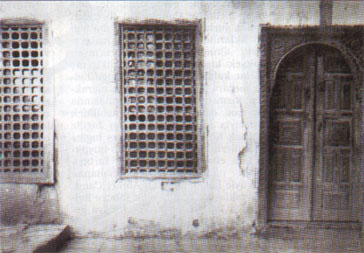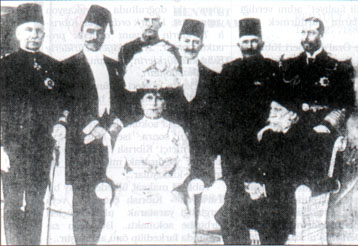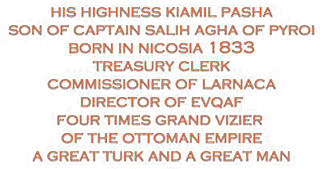| |
Between the Konak (or Atatürk Square)
in Nicosia and the Paphos Gate lies or lay one of the
capital's oldest quarters, now rapidly dissapearing before the housebreaker's ruthless
onsloughts. But when I first lived in Nicosia -a bare two hundred yards
away- this venerable enclave concealed behind high but tottering walls of mud brick some
dilapidated mansions of considerable age and a certain bygone dignity. Graceful arcades
that might collapse at any moment surrounded the inner courts of what once were mansions;
inside them, ceilings and galleries gaily carved and painted were crumbling slowly into
ruin. Narrow, tortous lanes twisted in and out of the quarter; here and there from its
sadly neglected gardens would rise secular cypress, noble and upright, its bronze green
tones suggesting, when seen against the turquoise sky, the colours on an old Persian tile.
Here was the family residence of Mehmed Kiamil Pasha, greatest Cypriote and most
distinguished Ottoman statesman of modern times.
 |
|
Entrance to Mehmed Kiamil Pasha's Paternal House,
Nicosia |
Kiamil Pasha's career was typical of typical of the Empire
he served so long and faithfully. His first post was in the household of the Pasha of
Egypt. In the course of his appointment he visited London for the Great Exhibition of 1851
in charge of one of the Pasha's sons and there began that daily reading of "The Times" which he told me in 1913, he had
never interrupted since then for a single issue. Kiamil's sojourn in England confirmed his
ripening admiration for this country and for its genius. Thenceforth, having full command
of English, he followed British affairs assiduously to the end of his life; thenceforth to
the close of his career he sought zealously the friendship of England for his country. He
cherished a deep affection for the British Royal Family, especially for King Edward VII
and Queen Alexandra, to whome he was warmly attached.
In Egypt, young Kiamil remained for ten years. Then, in 1860, he exchanged the service of
Abbas I for that of the Ottoman Government and for the ensuing nineteen years -that is to
say until he first entered the Turkish Cabinet- filled an astonishing number of
administrative appointments in every part of the empire. He governed, or helped to govern
many provinces, such as Eastern Rumelia, Herzegovina, Kosovo, and his native Cyprus whose
administration he lived to see removed from Turkish hands. He was not personally ambitious
although he rose rapidly; he was above all things a patriot and a scrupulously honest man,
the most ready of his countrymen to accept responsibility and undertake thankless tasks.
Four times between 1885 and 1913 he filled, and conferred rectitude and distinction upon,
the office of Grand Vizier, for the first time for centuries almost making a reality of
that sonorous phrase "Fuldiga Porta Ottomana" which
Neapolitan Foreign Ministers used to apply in their dispatches to the seat of the Turkish
Government. Then, in May 1913, the veteran octogenarian statesman unexpectedly appeares in
his native island, which he had not seen since he had ceased to govern it as far back as
1864.
The reason for the travels of the Grand Old Man of Turkey in the evening of his days was
no happy one. On the 23rd of the previous January, Enver Bey, as he was then, one of the
most forceful of the Young Turk leaders, burst with some of his associates into the
Sublime Porte while the Cabinet was actually in session, shot dead the Minister of War,
the genial and popular Nazim Pasha, at the Council table and overturned literally by force
Kiamil's fourth and last [Prime] Ministry. Unable to remain in Turkey after this bloody
coup, the ex-Grand Vizier was invited by his friend Lord Kitchener to stay with him in
Cairo, and after three months in Egypt decided to wait a favourable turn of fortune's
wheels, such as patience had brought him on previous occasions during the many
vicissitudes of his long and chequered career, in Cyprus. Suddenly conceived, then, as was
his journey and unforseen his arrival in the island, the provision of suitable
accomodation for someone of His Highness's (1) status presented a problem. As I was about
to go to Troodos for the summer, I offered him the loan of my house during my absence, a
suggestion the old gentleman was glad to accept.
Kiamil had landed in Cyprus with only two attendants, a valet and a black eunuch, but five
weeks later came the assassination of his Young Turk successor in the Grand
Vizierate,
Mahmud Shevket Pasha, possibly to avenge the murder of Nazim; and the prominent Old Turks
were either expelled or fled the country. Those included Kiamil Pasha's family, who had
hitherto been unmolested and now joined the old man in Nicosia. On my return from
Troodos,
Kiamil took the house next to mine, which was roomier and could accomodate his greatly
enlarged household. It was now a sight of considerable piquancy to watch from my window
his eldest son, Said Pasha, a decrepit roue and invalid of sixty or thereabouts, being
wheeled up and down the ramparts for his morning airing in a bathchair side by side with
the push-cart containing His Highness's youngest son, aged five or six. An unusual pair of
brothers.
|

|
|
Photograph showing Mehmed Kiamil Pasha seated |
On the 14th November following his arrival in the island, while full of plans for
revisiting England in 1914, Kiamil Pasha died suddenly of syncope while engaged in his
morning correspondence, and was buried that afternoon by his and my friend and landlord, Taib
Efendi, in the court of Arab Ahmed Mosque of
which Taib Efendi was the Imam. Truly Turkish in its contrasts and ups and downs had been
his life; truly Turkish was his burial. After a service in St.Sophia [Selimiye], the
great Mosque, the coffin was borne through the narrow streets of the walled town and
beneath overhanging lattices to its last resting-place, followed by the highest and lowest
in the island. Crowding upon the High Commissioner, the principal British officials and
the Moslem dignitaries, the rabble of the town struggled and pushed, instigated partly by
curiosity, partly by the hope of being able for a moment or two to take a part in the
bearing of the coffin.
As the procession approached the Arab Ahmed Mosque with its swaying burden a
flower-seller, dressed in the baggy white breeches of the Turkish peasant of Cyprus and
with bare legs and slippers, joined the throng, laid aside the tray of violets he had
brought into the bazaar for sale and put his shoulder under the coffin. It was the Grand
Vizier's nephew, his sister's son, who grew flowers and vegetables in the neighboring
village of Devtera and had come into the town that afternoon to ply his trade. He
encountered the procession accidentally, unaware of his uncle's death; but when he learned
who was being carried to burial, he took his place as a matter of course and no one
thought his participation strange.
For if the Ottoman Empire was an autocracy, it was in some respects the most striking of
democracies. It could give rank, honour and position to a man but not to his descendants;
a poor Turk or one of humble birth became Vizier or Mushir as easily as a Stambuli
Efendi.
The Turk needed not to be less gentleman because he wore peasant's clothes nor a parvenu
because he had reached eminence by a long ladder.
With his sense of fitness of things Sir Ronald Storrs, Governor of Cyprus from 1926 to
1932, caused a decent memorial to be raised over Kiamil Pasha's grave. He also composed
the English inscription, carved on the headstone below a Turkish one in old lettering. It
runs as follows:

|









